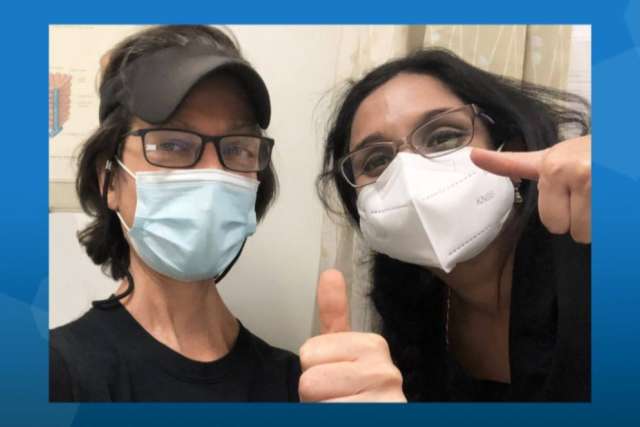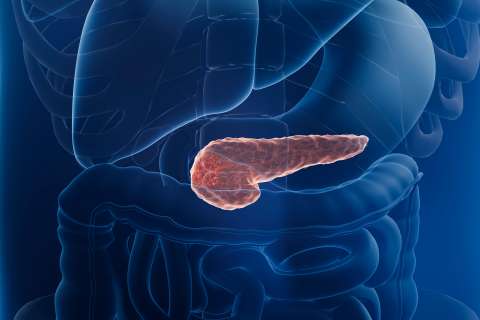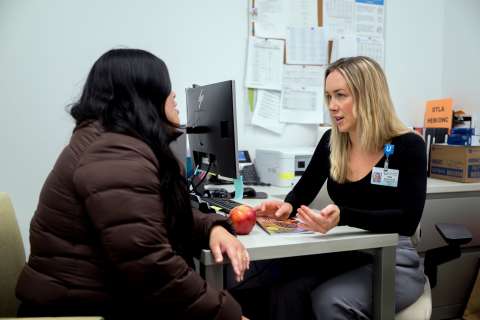Photo: John Sencio, who was diagnosed with stage 4 metastatic throat cancer 10 years ago, with Dr. Vijaya Surampudi. (Photo courtesy of John Sencio)
For patients who are unable to meet their nutritional needs through eating by mouth, the UCLA Health enteral nutrition clinic and total parenteral nutrition clinic (TPN) have proven to be lifesavers.
Launched within the past two years, the clinics provide nutrition to patients with certain cancers, malabsorptive/gastrointestinal disorders or neurological disorders.
For enteral patients — those who need to receive food through the GI tract — the food is delivered through tubes that go through the nose and down the throat to the stomach (nasogastric tubes), gastrostomy tubes (G tubes) inserted in the stomach, or jejunostomy tubes (J tubes) that go into the small intestine.
For TPN patients, nutrition is delivered directly into the patient’s bloodstream through a vein, bypassing the gastrointestinal tract.
“Both clinics support unique patients who are unable to maintain their nutrition by mouth, so they need alternate forms of calories,” says Vijaya Surampudi, MD, a co-founder of the clinics and assistant professor of medicine in the division of Clinical Nutrition at UCLA Health. “Generally, we prefer the enteral route because we want to preserve the GI tract.”
Filling a need
Dr. Surampudi is an endocrinologist and a physician nutrition specialist at the UCLA Center for Human Nutrition. She originally entered the field of nutrition focusing on obesity medicine and metabolic health. Through that work, she began to see a need for the management of adult enteral and TPN patients.
“We realized there was not enough clinical support for these unique groups set up for adults,” Dr. Surampudi says, noting UCLA Health has a pediatric GI clinic that also supports adult patients. “But there were many more adult patients that needed this.”
Dr. Surampudi, along with Michael Garcia, MD, assistant professor of medicine in the division of Clinical Nutrition at UCLA Health, piloted the enteral clinic in the summer of 2020, and it grew quickly. The TPN clinic was launched in January 2021.
Currently, about 300 patients are being served in the enteral clinic and about 100 in the TPN clinic, she says.
Specialized services
One of the enteral clinic’s goals is to reduce the need for patients to go to the Emergency Department when they have issues with their feeding tube, Dr. Surampudi says.
“This is such a unique population that we felt was being missed in their care,” she says, noting they work with pharmacists, home health professionals and speech pathologists, among others, to provide these services.
The physicians and nurses in the clinic are fully versed in the tubes and the mechanical issues that occur, Dr. Surampudi says. The clinic has dietitians on staff to help support a slow transition to taking nutrition by mouth.
“Generally speaking, we try to encourage more than 75% by mouth before stopping supplemental nutrition,” she says. “It takes a while to get there.”
Dr. Surampudi notes that patients undergoing treatment for head and neck cancer or gastrointestinal cancer often will be able resume eating by mouth when they complete treatment.
“With head and neck cancer, they usually have mucositis (inflammation of the body’s mucous membrane), and eating or swallowing is painful,” she says. “Once the treatment is complete, they start regaining their swallow function.”
While patients with cancer and gastrointestinal issues make up the majority of those undergoing enteral and TPN nutrition support, there are some with genetic conditions that preclude them from taking food by mouth. The clinic also supports patients with neurological conditions such as amyotrophic lateral sclerosis (ALS) and Parkinson’s disease who are unable to swallow, Dr. Surampudi says.
John’s story
When John Sencio survived Hodgkin’s disease in his 20s, he thought he was done with cancer. He wasn’t.
In his 40s, Sencio was diagnosed with stage 4 metastatic throat cancer, an aggressive form of head and neck cancer that required complex surgeries, multiple rounds of chemotherapy, and radiation.
That was 10 years ago. Now, the two-time cancer survivor is dealing with the long-term effects of radiation damage, including bouts of bacterial pneumonia caused by food particles lodging in his lungs when he eats. When food gets into the lungs, it can irritate the normally pristine air sacs, called alveoli, causing them to fill with pus. This irritation can affect breathing and infection can start to spread, leading to pneumonia.
“When I got cancer, the doctors told me if I was lucky enough to live past five to seven years, collateral issues are going to emerge,” Sencio says. “Now we have this clinic that can help me sustain and survive.”
Sencio, a television professional who is producing a documentary to chronicle his cancer journey, says his experience with UCLA’s enteral clinic has been “amazing.”
Sencio’s G tube was implanted 11 months ago after he was rushed to the Emergency Department with what was diagnosed as bacterial pneumonia. He gives high marks to the clinic for helping him learn to manage the tube.
“Before the clinics opened, the doctors would surgically give you a G tube and you’d be on your way,” he says. Now, during bi-monthly appointments his tube is checked for durability, his incision area is checked for leaks or infection, and then he gets into the “nuts and bolts” of nutrition with Dr. Surampudi and a dietitian.
“The key thing is are you gaining weight, are you maintaining weight, are you getting the proper amount of proteins, antioxidants, carbohydrates, vitamins, enough healthy fats? It’s really about chemistry.”
He’s uncertain if his G tube will be temporary or permanent, he says. “But I’m still here; I’m a thriver, and enteral nutrition is another chapter in my story of survival.”
It’s stories such as Sencio’s that make working in the enteral and TPN clinics gratifying, Dr. Surampudi says.
“Dr. Garcia and I always talk about how it’s actually quite rewarding working with this patient population because if you can just change something small but they start feeling better immediately, you get instant gratification,” she says. “You don’t see that sometimes when dealing with chronic diseases.”
Learn more about the Clinical Nutrition Program at UCLA Health.
Jennifer Karmarkar is the author of this article.





